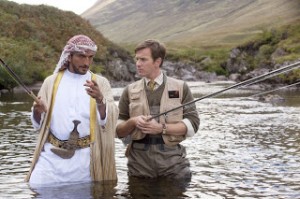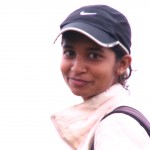Rosalie Tostevin reviews ‘Salmon Fishing in the Yemen’, the on screen adaptation of Paul Torday’s novel.
A visionary Sheikh (Amr Waked) dreams of bringing his beloved sport, fly-fishing, to his home in the Yemeni desert. He seeks help from a consultant (Emily Blunt), who turns to Britain’s leading fisheries expert, Dr Fred Jones (Ewan McGregor). The project seems both absurd and unachievable, and the level-headed scientist Dr Jones has strong reservations from the start. For the Sheikh, this is an exercise in faith, but when the Prime Minister’s press secretary (Kristin Scott Thomas) latches on to it as a good will story from the middle east, it evolves into an exercise in international relations.

The Sheikh and Dr Jones fly fishing together Source: nondisruptive-links
There are several key themes throughout the film which are relevant to Geology for Global Development. This is a story about a scientist who finds himself in unfamiliar territory when collaborating with people from outside of his academic world. He has to work on a project that is not supported by proven research – something creative, risky and new. In the process he learns about using science to make decisions in the real world, and how to work with local communities.
Below are some possible discussion points that I picked out whilst watching the film. Feel free to respond or add your own using the comments box at the bottom of the article!
- It is important to be honest about the scientific feasibility of a project to stakeholders, despite pressure to deliver or tell them what they may want to hear.
- Academics need to be prepared to work with people from outside of academia, where there may be vested interests and people willing to manipulate quotes and data to suit their agenda. Look at how scientists are struggling in the climate debate, for example.
- At one point in the film, the fisheries expert is coerced into the project against his better judgement by his boss. Who is then liable for the outcome of the project – him or his supervisor?
- The salmon fishing project makes use of an existing reservoir. Has there been a proper assessment before the takeover? Look at gulf of Mexico oil spill – of the two oil companies involved in the platform contract neither felt they should be fully responsible. It is important to have clear boundaries when it comes to responsibility and liability.
- Water resource distribution is an important source of conflict in dry countries such as the Yemen. Is fly fishing, a hobby rather than necessity, a fair use of water?
- Some of the local people do not welcome the project, identifying it as a glorification of western lifestyles. The sheikh fails to convince them all that in fact bringing fish to the desert is for him an act of faith and of respect for his community.
The film ends with Dr Fred Jones shouting enthusiastically about the need to involve the local community in the project…
The Imperial GfGD group hosted a screening of Salmon Fishing in the Yemen and discussed some of these issues after the film. Why not do something similar at your university? Get in touch if you have further ideas or film recommendations!
 Some background on the Yemen from Nikita Kaushal (Oxford University):
Some background on the Yemen from Nikita Kaushal (Oxford University):
There are a unique set of challenges facing the Yemen; rapidly depleting oil and gas resources, no core resource base to encourage industry, water levels too low to expand agriculture, and illiteracy as high as 40%, so they lack the skill base to encourage service based industries. The Yemen has an open-door policy for refugees, who are given equal rights to work as the local population, so the population is increasing. The post-regime change government is weak and troubled by internal politics – with the result that the country has not spent a significant proportion of the funding it received for development purposes. Countries like the US are focused on anti-terrorism in Yemen. Yemen is a prime example for the need for internal institutional and capacity building.
